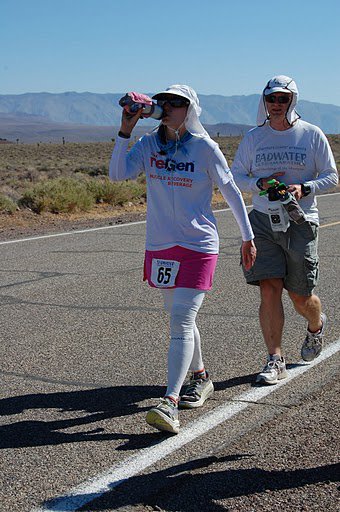
135 Miles in 120-Degree Heat: One Runner’s Story
Except for the whole 135-miles-in-brutal-heat thing, Meredith Murphy is pretty normal.
When she’s not busy taking two year-old daughter to the zoo, the park, or even yoga class, Meredith runs her own acupuncture practice (the Healing Point in King of Prussia, Pennsylvania). She’s a vegetarian too, and she loves cooking and baking. Kinda sounds like someone you’d hang out with, right?
But Meredith does at least one thing that’s not so normal. Earlier this summer, Meredith did what so many runners secretly dream of, and that only about 90 each year get the chance to do. If you follow ultrarunning at all, then of course you know what I’m talking about.
Badwater. 135 miles through Death Valley, right in the middle of the summer, when temperatures often get so hot that runners need to stay on the white painted line to avoid melting their shoes.
I was thrilled when Meredith got in touch with me after she saw a No Meat Athlete shirt photo on our Facebook page, and asked if I’d like to contribute a few shirts for her crew and magnets for their van, and to pitch in to help offset the cost of their epic stock-up at Whole Foods in Las Vegas before the race.
Of course I accepted, and a few weeks later, I was glued to the computer screen, eagerly refreshing Badwater’s live webcast to follow Meredith’s race and eventual finish of this monster of an ultramarathon in 46 hours, 22 minutes, and 38 seconds — nearly two entire days of running.
Meredith tells me she is “not a very exciting person.” Riiight. I caught up with her to talk about how she got in, her training, the race itself, and of course, what she ate out there as a vegetarian during the “World’s Toughest Footrace.”
Matt: Badwater is one of those races where, when you explain it to someone who hasn’t heard of it, it’s almost funny how ridiculously hard it is. 135 miles is one thing, and then you add in the heat and it just sounds insane. What made you even think about wanting to run it?
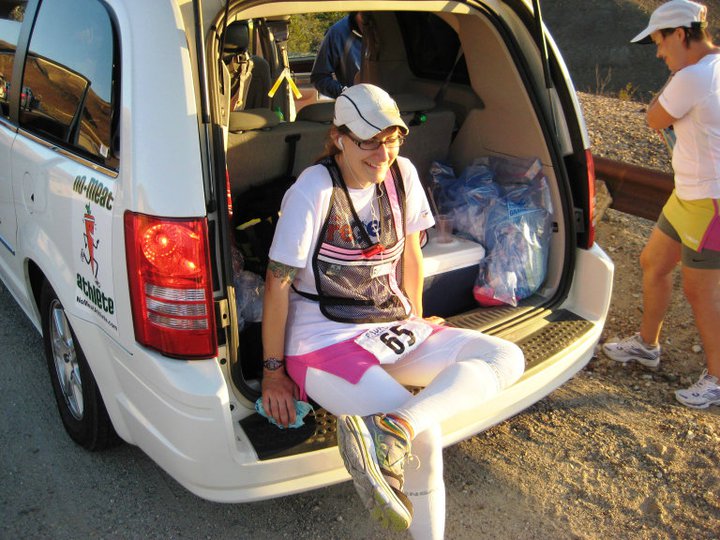
A year later I started running 50K and 50M races and it just went from there up in length of race. After I had my daughter, I started to run a few “timed” races, like 24 and 48 hour races and realized I really liked that format.
I first learned about Badwater after running my first 50 mile race. A friend who was a long time ultrarunner recommended that I watch the movie Running on the Sun which is a documentary about the race. I watched the movie and part of me was horrified by the race (and the visuals of people’s feet after the race) but part of me was quite intrigued at the same time. I made it a secret goal of mine to run this race.
Matt: Badwater is a dream for a lot of runners (including myself!), but since the field is so small, it’s hard to get in even if you meet the baseline requirements. What’s the application process like, and why do you think you got in?
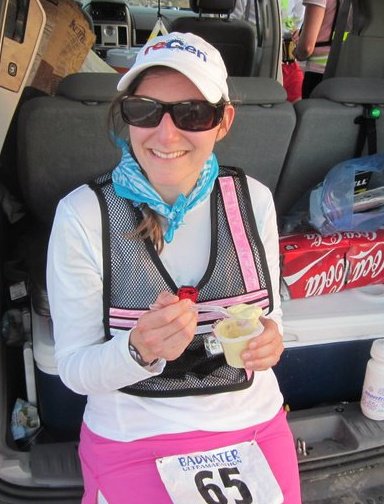
After I decided I wanted to run Badwater, I spent the next several years running 50 and 100 mile race and in 2008 crewed and paced a runner out in Death Valley at her first Badwater race. Before going out to crew and pace I thought I knew EVERYTHING about the race, boy was I wrong! Crewing and pacing was invaluable for my journey to my own Badwater race.
In 2009 I just gave birth to my daughter, so I was not going to run it that year, 2010 I applied and was not accepted, so I crewed and paced again, and applied once more in 2011 and was accepted. I never believed I would be accepted to run this invitation-only race. It is so prestigious and I never thought my chance would come. It was quite surreal.
I actually thought I was not selected, because the acceptance email went to my spam folder and it was only the next day that I realized that in 2010 I got a rejection email, so then I checked my spam and saw that amazing subject line that I had been selected to run!
I think I was selected because of my passion for the race, my running resume, as well as my letters of recommendation from two different runners. It showed depth (years of ultrarunning and multiple years of crewing/pacing) as well as passion.
Matt: What did you do to get ready for the race — and not just the distance, but the heat?
Meredith: My training was never as solid as I would have liked, but that is life with a toddler. Sleepless nights led to rest days or very easy days, but I tried to make the most out of the workouts I did and all were high quality workouts. I also did 90% of my running with a jogging stroller.
I ran a 100 mile race in the spring, as well as a 48 hour race. I also did a handful of 30 mile training runs in my neighborhood, which is quite hilly. The stair stepper, for me, has always been key for doing well at hilly and mountainous races.
I own a sauna and sat in the sauna in the weeks leading up to Badwater, but once again, with a toddler, this was difficult as well and I tried to fit the sessions in during nap times, etc. I also work, so balancing everything was a task upon itself!
Matt: How did you keep up your training mileage with a toddler?
Meredith: I do almost all my runs with a jogging stroller or on a treadmill in her play room. It’s been very hard to train well with a toddler, because if she is up all night, I cannot muster the energy to train the next day and you have to talk them into a jogging stroller, there is no forcing a toddler into a jogging stroller, that could just be disastrous.
Matt: Okay, so let’s talk about your diet a little bit. When did you become vegetarian and why? Was it for health, performance, or ethical reasons?
Meredith: I became a vegetarian early in high school after visiting a cow farm and chicken farm. At first it was mostly ethical reasons, but as time goes on, it is for health reasons as well. So I’ve been a vegetarian for 17, almost 18, years.
When I was in college, I fell into the bad vegetarian diet of pasta, pizza, grilled cheese, etc. It was easy and free at the dorm cafeteria. Once I was in graduate school I took cooking classes and nutrition classes and really learned a lot about eating a quality vegetarian diet.
Matt: So what types of foods now make up the bulk of your calories when you’re training?
Meredith: I eat a pretty boring diet and eat the same things over and over again. For breakfast I often eat oatmeal, old fashion or steel cut, or oatmeal pancakes and the occasional egg white omelette. I snack on fruit throughout the day and for lunch I eat a BIG salad with lots of mixed greens, avocado, and veggies. For dinner some sort of protein and veggies and sweet potatoes. We eat a lot of tofu in our house!
I was vegetarian long before becoming a runner, but I have found that my diet plays a big part on performance. I try to eat no processed foods (though on long runs I do eat granola bars) and make everything from scratch for the most part. No refined products.
Matt: You mentioned to me before that it’s not so easy to get a lot of the food you need as a vegetarian out in the desert. How did you handle eating during the race?
Meredith: My first year out to Death Valley I learned that it is not a very vegetarian friendly place. The food selection was very limited, as there is really nothing besides a couple hotels and a couple gas stations for 100 miles.
Last year I was more prepared and stocked up at Whole Foods on the way to Death Valley. This year, I was beyond prepared and brought not only a George Foreman grill, but a case of soy cheese and bean burritos, two cases of veggie burgers, hummus, wraps, baked tofu, fruit, granola bars, cottage cheese, yogurt, chips and salsa, PB&J fixings, and other various snack items.
During the race I started out eating okay in quantity, but as time went on, I really relied solely on fruit smoothies, fruit, and fruit nectar for the bulk of my calories. I ate some PB&J, pretzel M&Ms, ice pops at the gas stations (2 of them), miso soup when my stomach turned around mile 100, some french fries, and ginger ale.
Matt: I love how ultrarunners drink soda and eat fries during races. Somehow, it works! Can you give us a little overview of the race itself?
Meredith: The whole race was surreal for me. It was so hard for me to really fathom that I was there. The whole preparation leading up to the start of the race was filled with a lot of nervous energy. The start of the race just, happened, and then we were off.
I was about 5 miles into the race when I said to myself, “HOLY SH*T! I AM RUNNING BADWATER! OMG!” I kid you not!
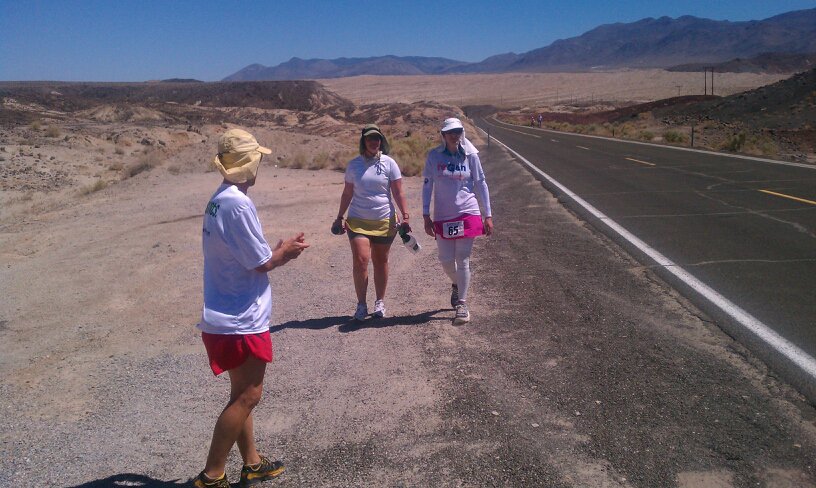
My crew was very good with keeping me cool with ice bandanas and spraying me with ice water. What happened here though was our thermometer in the crew van was broken and they kept tell me it was 95 degrees out and I was getting very irritated, but once we hit mile 42 and the store to get ice pops, we were told it was 120.
From mile 38 to about 48 I had fierce 25-mph head winds. There are no words to describe except soul sucking. 17 of those miles were up a mountain. It was like a hair dryer in your face, but more like a wind tunnel. It was hard to move forward and I had to keep my face completely wrapped up from the sand blowing and that was suffocating, but better than sand blasting my face.
Come the first night I was energized and felt great. I took a nap at the base of the second mountain, around 4am, for about 20 minutes. I felt refreshed and really powered up for some time.
As the second day warmed up, the heat did start to affect me, as I felt like I was overheating. Probably because my body had been working so hard for so long, it was not as efficiently cooling. My crew was great though and just kept spraying me with the ice water.
At mile 100, I took a 10-minute nap then woke up and started throwing up. At first I thought it was a good thing, as I had been fighting nausea for some time, but i just could not keep anything down. Here was where I started nursing miso soup. I was worried for the first time that I may not finish. But once again, i had a kick ass crew and they gave me just the support I needed.
Finally, we hit the turn into Lone Pine and the last stretch of the race. Unfortunately, the last stretch is 12+ miles up Mount Whitney, so no cruising to the finish. I had a hard time eating anything of substance, so I was really running on empty.
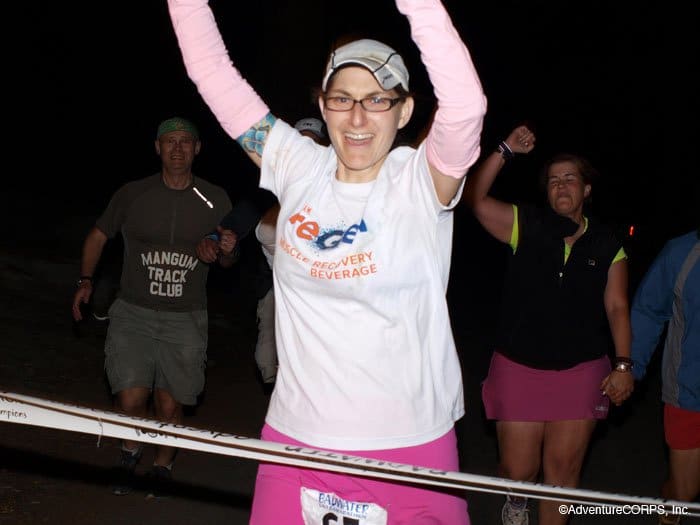
I think the average up the mountain is about 4 hours. It is the end of the grueling race, it is up a mountain at a decent grade, and at some point, the air got quite thin and I was really huffing and puffing, but at least I knew the finish was right around the corner. As it was the middle of the night, I could see the finish line for miles. I could see the flash of the camera at the finish when people crossed. It was so far away, but so close, for so long.
Crossing the finish was just the most incredible feeling. My crew and I were all holding hands, but once I saw the finish line tape I just sprinted, something just came over me. I could not have been happier. It was just the most incredible journey.
Matt: I heard you and your crew did some sort of booty-shake-dance as you crossed the finish line. Can you give us some pointers on how you executed this, so that we might do the same thing at the end of our races?
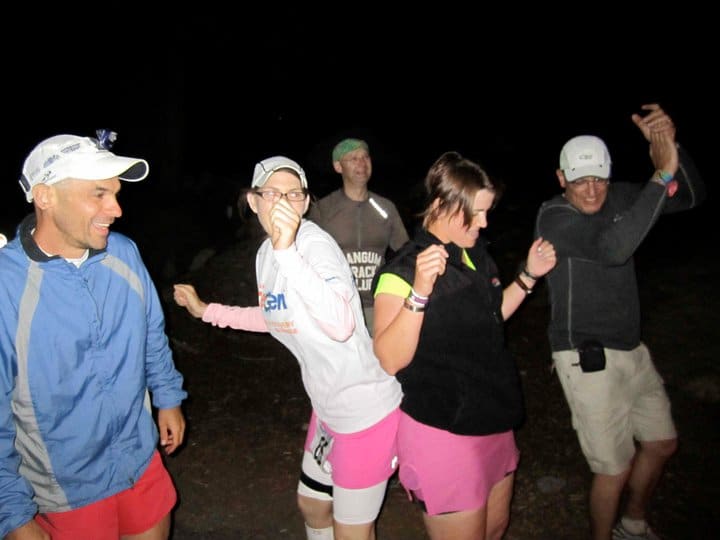
Matt: 120 degrees just sounds so unbearable, even if it were just for a 5K! Does it feel as awful as it sounds, or is it somehow different because of the lack of humidity or because you prepare for it with the sauna?
Meredith: It is hot. I spent a lot of time in the sauna, which I own, which helped with convenience, but I could not do it unless my daughter was napping or with my husband. It was still hard to fit in. I would sit in there at 140F and most sessions were 45-60 minutes.
This year was not as hot as last year in Death Valley, but it was still hot. My crew did really well with keeping me cool. First, I was covered in white clothing head to toe. The sun is so strong and keeping that off of your skin really helps. I had an ice bandana around my neck as well as fresh ice in my bottle every mile. My crew also had a big spray bottle filled with ice water.
It is hot, like an oven, but it was bearable, at least during the race. I know driving back from the finish to Vegas we stopped at Furnace Creek for water and bathroom and I could not believe how hot it was and did not want to be outside the car! I could not believe I had just spent two days in that weather in a race!
Matt: I know that at least one other vegetarian, Ed Ettinghausen, ran Badwater this year, and Scott Jurek has obviously excelled at Badwater as a vegan. But I’d imagine many people are still shocked to discover that you can do something of this magnitude and difficulty without eating meat, and that’s why I was thrilled to be able to have No Meat Athlete sponsor you. Did you get any strange looks with the shirts and the magnets on the van?
Meredith: Actually, most of the feedback we got at Badwater was really positive. With all the crews and runners, there are a lot of people and the shirts and signs we had for No Meat Athlete really attracted a lot of good attention. We also met a lot of vegetarians and I invited all of them to stop by and get some food at our hotel room if they needed.
I think most people in ultrarunning are familiar enough with Scott Jurek to know that vegans and vegetarians can excel at ultrarunning, but outside of that community, I always get dumb comments about not getting enough protein and other things.
Matt: Do you have any really particular diet advice for vegetarian runners and athletes?
Meredith: Eat high quality foods. Avoid processed crap, even organic all natural processed food is still processed. Eat clean and eat your fruits and veggies and beans!
Matt: Except during races. Then, drink soda and eat fries. 🙂 For someone who might be, say, a half marathoner or marathoner, but is fascinated by ultrarunning and wonders if he or she could ever get to the point of running 50’s or 100’s or even a race like Badwater, where should they start? Is there a mindset shift that has to happen, or is it really just a matter of going out for longer and longer runs?
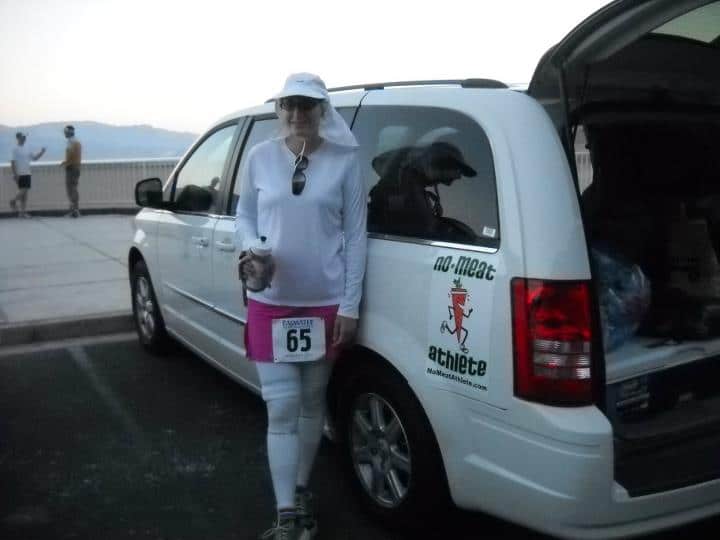
Transitioning from marathon to ultra required longer long runs and a lot of back-to-back long runs, which are long runs two days in a row. As time went on, I moved to single long runs per week and those would peak at around 6-8 hours, with a lot of power hiking in addition to the running. A lot of ultrarunning is truly mental and that is the missing link for a lot of people.
Matt: So the big question… are you going to do Badwater again? 🙂
Meredith: I would love to. I would need the funds and need to be accepted to run again, but oh boy would i love to do it again.
Huge thanks to Meredith for representing No Meat Athlete at Badwater, and for taking the time to share the experience with us!
Leave a Reply
thanks Jason!!! It is quite a juggling act indeed. Nothing ever goes as planned with a toddler!
Awesome.
Wow … congrats Meredith!
I ran one full marathon years ago … but then received severe leg injuries in a vehicle accident 7 yrs ago and docs didn’t know if I would ever walk again. Thankfully I not only walk, but I returned to running 4 years post-accident.
In the past 3 years, I’ve slowly built up strength and did 2 half-marathons and am doing 2 this fall … Lehigh Valley and Philadelphia. (I live near you – about 30 miles west of Philly)
If my legs hold up well, I want to do a full-marathon next year and then aim for an ultra.
Badwater is a dream of mine, but with this body I’m not sure … so it was great to be there vicariously by reading this.
ps: if you do it again – I would consider crewing, to see what it’s like 🙂
I am in awe. I might want to add this to my bucket list someday…someday.
Wow, merideth. I loved reading this. What a wonderful experience. You really know how to push your body to do things I couldn’t even imagine. I am so impressed with you, and all your running adventures.
Fantastic job, Merideth! Way to represent for for Team Veggie!
I’m trying to qualify for Boston this year at the NYC marathon and my wife gave birth last month to your second child. The last couple of weeks I’ve been thinking how I’ll keep up with the 50-60 miles/week of training with an infant at home. I have a different perspective after reading this.
Thank You Meredith and Congratulations!
I have the Comrades on my list but as Matt put it … I also secretly dream of running Badwater some day.
Congratulations Meredith! That is amazing! I really enjoyed reading about your journey!
I love how NORMAL she is! She sounds like she has a regular life with this extraordinary hobby. It’s nice to read about a runner that I can relate to.
Congrats!!
Wow, Meredith congratulations! Sounds like an incredible feat. Great to see more veggies in the race to chase Scott J’s fame. haha. I’d love to crew for someone and get to know the race a little bit better one day, that’s such a great accomplishment to finish!
This is so inspiring! I’m in awe!*
WOW. Meredith, you’re my hero!
Holy cow, that’s amazing. I love running but not sure I could ever do something like that. Thanks for sharing a memorable story.
I don’t even know what to say. I am often so inspired to hear race stories and feel the urge to try. This doesn’t sound appealing but I so commend Meredith. The nice thing is I have a marathon next month and I’ve been sidelined with bronchitis. After hearing about Meredith I’m like marathon- no problem. My favorite quote was “even organic all natural processed food is still processed” love that.
This is just what I needed. Thank you Meredith and thank you Matt.
Very inspiring! :O
I’m so inspired and motivated by this, on so many levels. I’ve been living on the paleo diet, which has greatly improved my life because I’m allergic to gluten and dairy. And carbs don’t sit well with me. I get jittery with even fruit. Oh, and I’m allergic to bananas and a few others, which doesn’t make it easy. My body is extremely picky, but I feel like it’s time to get off the meat.
But I have to ask, how do your joints do it? Do you get the random ankle and knee pains that follow throughout the race? I’m reaching a point in my fitness level where I know my muscles can handle a marathon or more. It’s my joints that are holding me back. And none of the aches or pains are consistent. I ran a half marathon earlier this month and could hardly enjoy it because of lateral knee pain with every step. Took a week off of all training followed by a week of easy running, ran a 10K, and now it’s my right ankle. I just don’t understand what I’m doing wrong. I just turned 21, I don’t think it’s normal to have so many random joint issues. I truly think my diet is factoring into this problem, be it inflammation or maybe something to do with the amount of meat I consume? Any recommendations? I’m really open to anything at this point. I’m just so frustrated, and I want to run so badly.
Meredith,
You really are amazing, not just by running it but fitting in training with working and a toddler!! I just watched the Badwater movie and that race in uncomprehensible to me. Kind of like the previous gal wrote, how do you deal with aches and pains you get doing the training for that? Do you have someone who trades off with you and gives you accupuncture? That must help a lot otherwise I don’t know how runners do these runs. Like the gal previously I have feet or knee issues but some of it is because my age, late 40’s. Thanks for speaking with Matt.




Amazing performance Meredith. Juggling the training necessary for Badwater with a toddler and husband = inspiring.